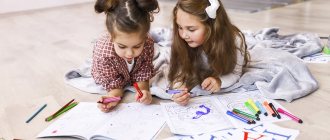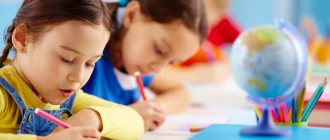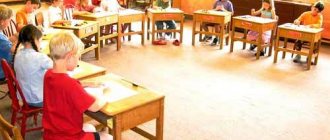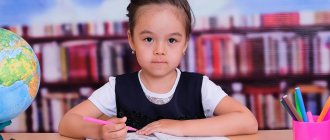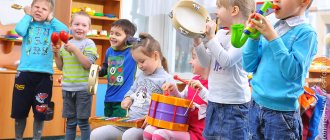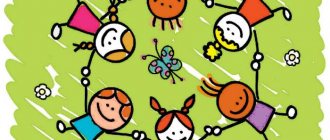An important stage in the educational process is preparation for school, which often results in stress for both parents and children. It is very important to ensure that the baby not only has a certain list of skills, but is psychologically ready, feels self-confident, and wants to learn. And achieving this, as practice shows, can be difficult. We invite you to familiarize yourself with the advice of experts and teachers aimed at making preparation as painless but productive as possible.
WHAT DOES SCHOOL READINESS MEAN?
In psychology, it is customary to distinguish 4 levels of a child’s preparation for first grade.
| Name of readiness level | a brief description of |
| Physical | This refers to the general state of health, height and weight of the baby (by the age of 7 these indicators are 116-130 cm and 21-27 kg for a boy, 116-125 cm and 20-25 kg for a girl). |
| Intelligent | The child must have a certain vocabulary, developed skills and abilities. |
| Personal | The future schoolchild must understand that a new page is opening in his life, that he is beginning to comprehend a new type of activity. It is important that the child is aware of the specifics of his behavior and knows how to communicate with peers and teachers. |
| Emotionally-volitional | The child must be able to set a goal and make efforts to achieve it. |
If parents do not make due efforts in preparing for entering school, the child will face serious difficulties, which may cause his reluctance to study.
Creativity training
Purchase in advance a starter kit for creative activities: an album, brushes, paints, pencils and felt-tip pens. To begin with, let your child practice coloring coloring pages. Buy several close-up coloring books with different themes (preferably one that your son or daughter likes). Explain that the baby should not go beyond the lines, let him learn to be careful now.
It will be great if you study some geometric figure the day before and then color it together. Or, on the contrary, draw a watermelon or an orange, and then ask your child what shape it has.
Do different activities: draw, paint, sculpt, cut out. This way the child will learn the material covered even better.
SAMPLE LIST OF KNOWLEDGE
To check how ready your baby is for the new stage of his life, you can check the following list of skills. Let us immediately note that the information is approximate, a child may know one thing, but not understand anything else - this is normal, because everyone’s abilities are different. But parents should take on board an approximate list of knowledge and skills.
By the age of 6, a child should know well:
- your full name, address (starting from country), date of birth and age;
- FULL NAME. parents, as well as where they work (there is no need to require the child to memorize the exact name of the company - the profession and the abbreviated name will be enough);
- names of animals and their offspring;
- vegetables, fruits, berries – be able to show them in pictures and in reality;
- give examples of wintering and migratory birds, garden and wild flowers, wild and domestic animals, explain how they differ;
- months of the year (what they are called, in what order they are located on the calendar, what month it is);
- primary colors and shades;
- alphabet - know the sequence of letters in the Russian language, what it looks like, what words it contains.
Some children also know the English alphabet, but this is not necessary.
A child should know all this before entering the doors of an educational institution for the first time.
SHORT LIST OF SKILLS
Next, we will get acquainted with what exactly preschool children who are ready for elementary school should be able to do.
Math Skills:
- be able to show shapes: circle, rectangle, square, triangle, oval;
- know the sides: right and left, top and bottom;
- count at least to 20 and back, but preferably count to 100;
- the child must understand neighboring numbers within 10 (that is, if he is told the number 5, he must understand that there is a 4 in front of it, and a 6 after it);
- perform addition and subtraction within the first ten;
- understand the essence of the concepts “more - less - the same”, “broad - narrow”.
It is important that the child can apply his knowledge in a new situation - for example, cope with the task of counting buttons, although before that he only counted toys.
To develop speech you need:
- be able to retell a text just read or recall previously studied text;
- make up a story based on the picture;
- understand the difference between vowels and consonants;
- put nouns in the plural (cat - cats) and, on the contrary, in the singular;
- know a few simple poems and recite them at the request of an adult.
It’s good if a 5-6 year old child can write fairy tales, use rich vocabulary, solve riddles, and select words containing a certain sound.
General skills:
- know the items of clothing and shoes well, understand which one goes where and how to wear it;
- distribute objects into groups based on a certain characteristic (for example, color), find what is superfluous;
- copes well with cutting with scissors;
- draw horizontal and vertical lines with a pencil;
- draw geometric shapes and paint over them, following the contour;
- sculpt vegetables, figures of simple animals;
- make crafts and applications from natural and available materials.
However, it is important to remember that the child must be ready for school, first of all, psychologically - he must want to learn. That is why a self-confident, inquisitive preschooler, even if he does not have extensive knowledge, will perceive change much better than his peer who knows a lot, but is not distinguished by psychological maturity.
Math teaching
When the baby is still 2-3 years old, you can gradually begin to teach counting. Count together steps on a walk, toys at home, candies and fruits. Afterwards, you can show your child the counting sticks and start counting them.
It is very effective to learn numbers in pairs (2 and 3, 4 and 5). This will make it easier for your child to understand adding numbers. When you start explaining to him the rule for adding one, it will not be difficult for him to tell you the correct answer. Take one digital pair per lesson, but before taking new material, review what you have covered.
Geometric shapes can be easily and interestingly studied using cookies of different shapes. Start with simple shapes: circle, triangle, square. The store today has cookies to suit different tastes and budgets.
Once you are familiar with simple shapes, you can learn to draw them.
Remember that you will achieve greater results if you alternate activities between each other.
AT WHAT AGE DO YOU START PREPARATION?
Parents often wonder when they can start preparatory classes so that it is not too late, but at the same time so that the baby does not become overtired. There is no definite answer; it all depends on the individual predisposition of each particular baby and his desire to learn new things. At 3 years old, you can count fingers on your hands with your child, tell him about animals, show him pictures, video fragments, find animals and birds while walking (for example, show the baby in person what a pigeon looks like).
Experts advise starting to get acquainted with letters and numbers at 4 years old, and 5-6 years old is considered the most successful age for learning to read.
You shouldn’t rush your baby - forcing him to study by force can only kill his thirst for knowledge, so it’s important for parents to be cunning: use a playful form, disguise the “lessons” so that the baby doesn’t even realize that he’s being taught something.
You can use every free minute to prepare. For example:
- while walking, find objects of a certain color;
- count how many dogs and buses you saw;
- find objects whose names contain the sound [b].
These forms of activities are interesting to children, so they are happy to complete tasks without feeling bored.
Note that if at an earlier age, for example at 3 years old, a child shows interest in letters and numbers, then you can introduce him to them in a light, unobtrusive form.
Teaching writing
Children's hands are not at all ready to write. Here parents will have to try hard to train their son or daughter.
During preparation, exercises and games to develop fine motor skills will play an important role. Already at two years old, you can give your baby different pasta, cereals, some beads and play with him (of course, make sure that the baby doesn’t put anything in his mouth). You can also try tying your shoelaces together and massaging your arms.
Buy children's scissors with rounded ends at the store and show your baby how to use them. Let him try to work with them himself.
When learning to write, start by writing block letters. They are easier to learn, and only then move on to capital letters. Make sure your child practices regularly and teach him not to go beyond the lines on a sheet or notebook. And for this important task, you can buy a good and comfortable pen for the child so that he does not experience discomfort when writing.
There are excellent finger exercises that help kids stretch their hands during breaks between training: “The fish in the lake were splashing in the quiet, warm water. They will either shrink, unclench, or bury themselves in the sand.” At the same time, let the child actively move his fingers and the entire arm.
Buy a notebook from the store that will meet all school requirements. There are a lot of them on the shelves today. Let your baby gradually get used to the attributes of school.
WHY DO YOU NEED PREPARATION FOR SCHOOL?
Even loving and responsible parents ask this question. It would seem, why teach a child something if teachers will take care of it very soon? Wouldn’t it be better to prolong the happy moments of his childhood? There is a logic to this, but it is necessary to understand that modern educational programs are designed for children with a certain level of training. Before enrolling in primary school, the child will be asked to take a test or an oral “interview”. The realities of modern life are such that most first-graders cross the threshold of school already knowing how to read. That is why, so that the child does not feel “the worst of all” and does not receive excessive workload, at the age of 5 it is necessary to begin targeted classes for preschoolers.
After all, if it turns out that the level of knowledge is insufficient for a particular school, they may even refuse admission, offering to attend special correctional classes where children with developmental delays study. This will undoubtedly have a negative impact on the development of the child’s personality.
Another common option is that parents drag out education until the last minute, and in the summer, 3 months before school, they begin to actively “stuff” the child with knowledge, which leads to serious workload and loss of interest. Such accelerated learning poses a danger to the nervous system and immunity of a preschooler.
It is not necessary to conduct home lessons in a boring way, sitting at a desk. Mom or dad can organize acquaintance with letters or learning to read in such a way that the child will only enjoy it.
Another pressing problem is the eternal lack of time for parents. Many mothers are forced to go to work, so they do not have the opportunity to fully prepare their baby for first grade. Therefore, you need to start earlier, so that you can devote 10-15 minutes a day to gaining knowledge and skills, having 2-3 years left to consolidate and work through difficult moments.
We also note that training at home involves not only gaining knowledge, but also developing independence, responsibility, dedication, and interest in learning. Without these important points, it will be very difficult for a child in first grade.
WHERE TO START PREPARING?
The role of parents at this stage is undeniable. Even if a child goes to kindergarten and there, together with a group, receives the necessary knowledge, without reinforcement at home, it will be of little use. In addition, you can enroll your preschooler in special groups and sections - a collective form of work will help him learn to communicate and work together.
But it is also important to conduct individual training at home. Calendar planning will help you achieve success. Parents of a child who is 4 years old can start a notebook in which they roughly distribute what they need to teach the child. This activity can be coordinated with kindergarten teachers so that the child reinforces the material without becoming overtired.
And every day you need to play educational games with your child for 10-15 minutes, tell him about objects in the world around him while walking, introduce him to colors, sizes, distances, and teach him to count.
There are many early development methods, elements of which can be used by modern families.
- Doman's cards will help to introduce your child to animals, plants, and meteorological phenomena in an easy and unobtrusive manner.
- Montessori frames will clearly explain the essence of shape and size.
- Various constructors and mosaics will help improve logic, abstract and spatial thinking.
- Cubes for children will help them learn to read (if letters or syllables are written on them), work with colors (this requires a multi-colored set), and understand what “close” and “far” are. Preparation tasks can be very diverse.
The most important stage of preparing for school is instilling in a child the skills of independence. He must be able to dress himself, tie his shoelaces, and fasten his zippers. There will be physical education lessons at school, so the child needs to be taught in time to quickly and correctly put on sportswear and shoes. To do this, you can play a rescuer - invite the child to put on a suit as quickly as possible, since the salvation of, for example, an entire planet will depend on his speed.
It is equally important to instill in a preschool child the norms of etiquette - teach him to say hello, say goodbye, and talk politely with elders.
PSYCHOLOGICAL PREPARATION
It is very important that the child wants to go to school and gain new knowledge. Parents need to perform special exercises with him that will help him find psychological comfort. For example, play school: the role of students will be played by dolls and toys, and the baby will temporarily become a teacher. Next, the mother gives instructions - the child needs to study well, remember everything, and then explain the material to the dolls. It’s even more interesting if parents become students.
Choosing an outfit with your child will also help. Many educational institutions have a dress code, but this does not prevent you from taking your child with you to the store so that he can choose a suit, backpack, pencil case, and pens that meet the required standards. All this will help maintain interest.
Reading training
Pay attention first of all to reading lessons. After all, if your baby masters the basics of reading, it will be easier for him to learn other subjects. Start by learning the letters (preferably in alphabetical order). Remember the elements of the game and try to sculpt each letter from plasticine or clay. Ask your child what this letter looks like.
Read a simple text together and ask your child to find the letters you studied today. Afterwards, you can invite the child to retell the selected text or at least answer the questions.
USEFUL RECOMMENDATIONS
Here are a few ideas that will help parents develop their own program for preparing their child for first grade.
- You shouldn’t scare your child or tell him that school will be difficult. It is better to help him get rid of psychological discomfort in a playful way.
- Before lessons, it is important to help your child learn to maintain attention. You can start with the simplest thing - telling him what is really interesting to him, carefully observing whether the baby remains interested. Next, move on to information that is less attractive to the child, but more useful from a learning point of view. The approximate duration of attention is 15-20 minutes, this is the number you should strive for.
- If for some reason a child does not go to kindergarten, at the age of 5 you need to actively introduce him to other children. Otherwise, he will go to school not ready to communicate.
- It is better to teach your child to get up on time in advance, so a month or two before the first bell you need to gradually wake up earlier and earlier.
- In order not to spoil your baby’s eyesight and posture, you need to practice sitting at the table with him and set an example yourself. You can come up with a fun game - whoever sits correctly gets a point, whoever is hunched over loses a point. At the end of the week a count is carried out. Depending on how many points the child scores, the parent prepares and gives him a small gift.
Of course, in the end, each parent develops his own method of preparing a child, taking into account his individual characteristics. However, general advice still needs to be taken into account. And it is important to remember that only patience and attention will help a child overcome the difficulties that arise and enter a new stage of life.
Child health and school
Separately, it is worth discussing the issue of the health of a child who is preparing to go to school. While parents are busy educating their child at home, they often forget about his health.
6-7 years is a period of active changes in the body of every child. Usually at this time, baby teeth change and growth of the whole organism occurs. At this age, children need more physical activity. If a child must sit at a desk, then it is better to send him to school at the age of 7 (from a health point of view, this will be better for the baby). If you do send your child to school at age 6, carefully study what physical training the school offers. It is very good if the school has a swimming pool and an equipped gym, because a growing body requires physical activity several times a week for the heart, blood vessels and joints to function properly. In addition, we remember about changes between lessons. During this time, the student should rest outside the classroom, and the room should be ventilated.
The parent, in turn, can provide the child with regular rest before school. Every child needs a break from:
- communicating with a large number of people;
- catering;
- large amounts of exhaust gases and household chemicals.
According to doctors, the best vacation for a child is in the village with his grandmother. Only there today the maximum amount of fresh air, most of the products from your garden and vegetable garden are preserved, and the child will spend a lot of time in nature. This way he will develop immunity to new viral diseases and infections, the child will spend his days actively and take a break from the bustle of the city.
Develop your child at home and help him explore the world around him. Remember that every child is individual, but all children must master certain skills by the age of 6-7 in order to cope with tasks at school, learn new things every day and communicate with peers.
